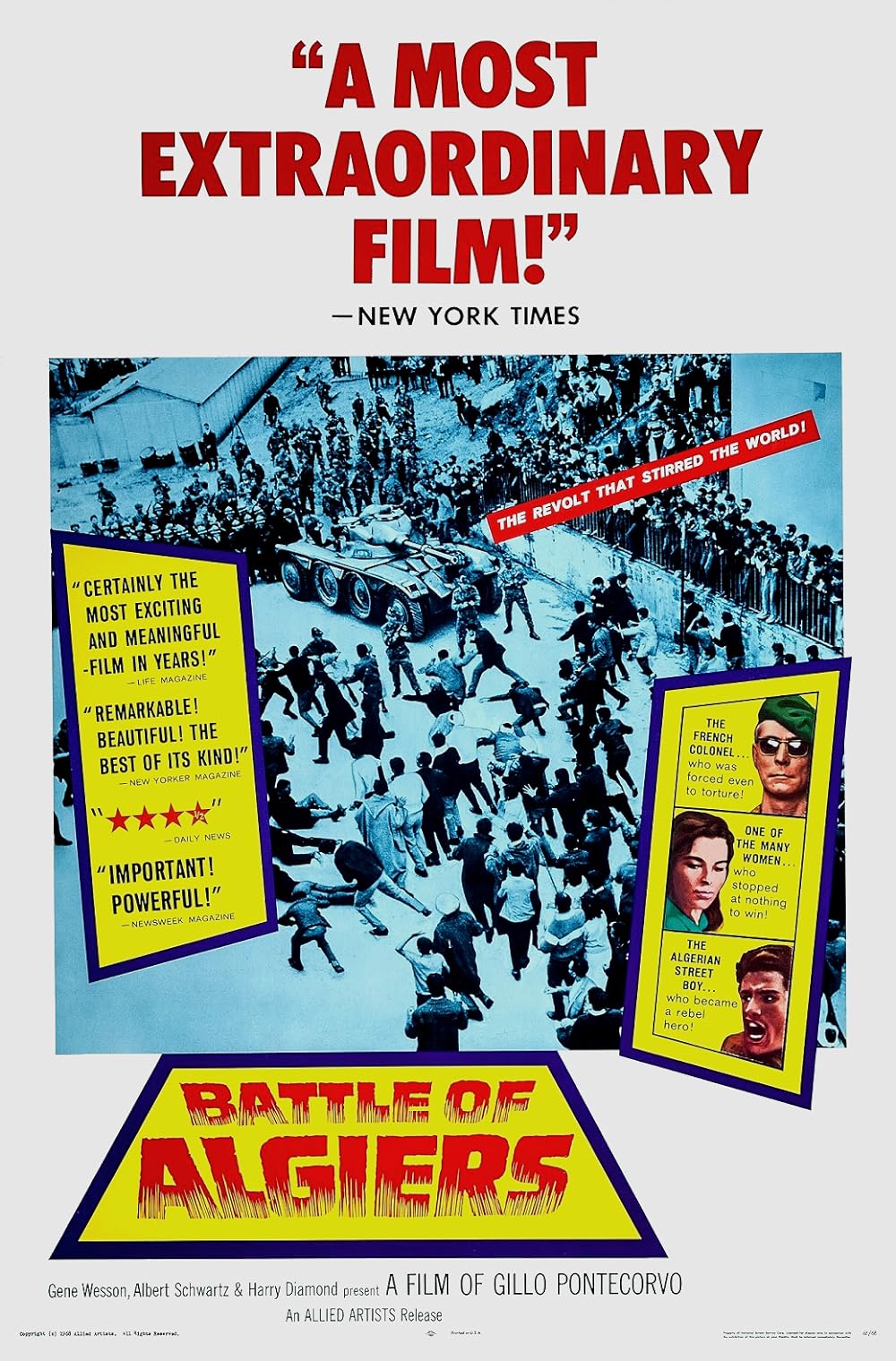The Battle of Algiers (1966) – A Riveting Account of Revolution and Resistance
Type: Movie
Country: Italy, Algeria
Genre: War, Drama, Historical
Release Date: September 8, 1966
Duration: 121 minutes
Director: Gillo Pontecorvo
Production Companies: Casbah Film, Igor Film
Cast: Jean Martin, Brahim Haggiag, Yacef Saadi, Samia Kerbash, Ugo Paletti
Quick Review:
“The Battle of Algiers” (1966), directed by Gillo Pontecorvo, is a powerful war drama that chronicles the Algerian struggle for independence from French colonial rule. The film’s documentary-style realism, gripping narrative, and compelling performances provide a raw and unflinching look at the brutal urban warfare between the French military and the Algerian National Liberation Front (FLN). Recognized for its historical significance and cinematic excellence, this film remains a landmark in political cinema.
Plot Summary:
“The Battle of Algiers” meticulously portrays the events of the Algerian War of Independence (1954-1962), focusing primarily on the years 1954-1957 in the capital city of Algiers. The film opens with the French paratroopers extracting information from a captured FLN member, leading to the eventual capture of Ali La Pointe (Brahim Haggiag), a prominent FLN leader.
The narrative then shifts back in time, recounting Ali La Pointe’s recruitment into the FLN and his rise within the organization. The FLN orchestrates a series of guerrilla attacks against the French authorities, employing tactics that include bombings, assassinations, and widespread urban resistance. In response, the French military, led by Colonel Mathieu (Jean Martin), implements a ruthless counter-insurgency campaign.
As the conflict intensifies, the film delves into the moral complexities and human costs of the war. Both sides resort to extreme measures, resulting in a cycle of violence and repression. The FLN’s determination to achieve independence is met with the relentless might of the French military, leading to a dramatic and sobering conclusion.
Characters and Performances:
- Jean Martin as Colonel Mathieu: Martin delivers a commanding performance as the pragmatic and calculating French officer tasked with quelling the uprising. His portrayal captures the cold efficiency and moral ambiguity of military leadership in times of conflict.
- Brahim Haggiag as Ali La Pointe: Haggiag’s portrayal of Ali La Pointe is intense and compelling. His character’s transformation from a petty criminal to a committed revolutionary embodies the spirit and resolve of the Algerian resistance.
- Yacef Saadi as Djafar: Saadi, an actual FLN leader, brings authenticity to his role as Djafar, one of the movement’s key strategists. His performance adds a layer of realism and insight into the inner workings of the FLN.
- Samia Kerbash as Hassiba Ben Bouali: Kerbash provides a poignant and humanizing portrayal of Hassiba, a young female revolutionary. Her character highlights the vital role of women in the struggle for independence.
- Supporting Cast: The film’s supporting cast, including non-professional actors, contributes to the documentary-like authenticity, enhancing the immersive experience.
Direction and Cinematography:
Gillo Pontecorvo’s direction is masterful, blending narrative storytelling with documentary realism. His use of handheld cameras and natural lighting creates a visceral and immersive viewing experience. The film’s black-and-white cinematography by Marcello Gatti captures the stark contrasts of the urban landscape and the harsh realities of war.
The meticulous attention to detail in the film’s recreation of the historical setting and events lends a palpable sense of authenticity. Pontecorvo’s unflinching depiction of both the French military’s tactics and the FLN’s operations provides a balanced and nuanced portrayal of the conflict.
Music:
Ennio Morricone’s score for “The Battle of Algiers” is both haunting and evocative. The music underscores the tension and drama of the narrative, enhancing the emotional impact of key scenes. Morricone’s use of rhythmic, percussive elements mirrors the intensity and urgency of the revolutionary struggle, while melodic themes evoke the resilience and spirit of the Algerian people.
Why It Endures:
“The Battle of Algiers” endures as a cinematic and historical landmark due to its unflinching portrayal of the complexities of revolutionary warfare. The film’s balanced and humanizing approach to both sides of the conflict invites viewers to engage with the moral and ethical dilemmas faced by individuals caught in the turmoil of war.
Its influence extends beyond cinema; it has been used as a teaching tool in military academies and political science courses worldwide. The film’s relevance to contemporary discussions about insurgency, counter-insurgency, and colonialism ensures its continued significance and resonance.
In Conclusion:
“The Battle of Algiers” (1966) is a powerful and enduring film that offers a raw and realistic depiction of the Algerian struggle for independence. Directed by Gillo Pontecorvo and featuring compelling performances, the film’s documentary-style realism and gripping narrative make it a seminal work in political cinema. Its exploration of the human cost of war and the complexities of revolutionary struggle ensures its place as a timeless and influential masterpiece.


